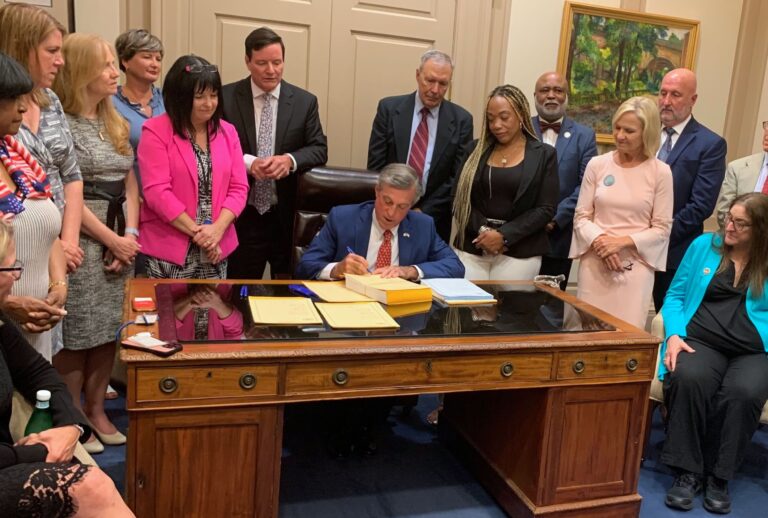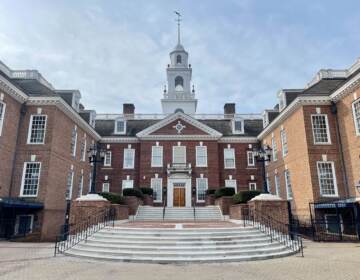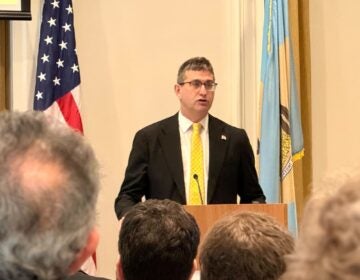Delaware legislature wraps with over 50 bills acted on in final day as abortion and death penalty bills go to Gov. Carney
Legislation passed by the General Assembly includes creating a new hospital tax and a procurement process for offshore wind projects.

Delaware Gov. John Carney signs the FY 25 budget and other spending bills on June 30, surrounded by members of the state House and Senate. (Sarah Mueller/WHYY)
From Philly and the Pa. suburbs to South Jersey and Delaware, what would you like WHYY News to cover? Let us know!
This story was supported by a statehouse coverage grant from the Corporation for Public Broadcasting.
With a big yellow lab panting behind him, Gov. John Carney signed the FY25 budget on Sunday night. He also put his signature on a one-time supplemental spending plan, a capital spending bill and Grant-in-Aid legislation providing funding for nonprofit groups throughout the state. State lawmakers also passed dozens of bills before session ended on the last day of June, but a few didn’t manage to make the cut.
The FY25 budget is $6.1 billion, an almost 9% increase in spending compared to last year. Lawmakers also signed off on a $168 million supplemental spending proposal.
“We’ve taken action to make our communities safer, protect our environment, and we continue to invest in our students and educators,” Carney said. “I’m proud that our budget makes these important investments and is also sustainable.”
The budget directs $50 million towards a goal to increase teacher salaries to a base pay of $60,000. It also adds $94 million to cover Medicaid costs and services and more than $6 million in state and federal funding to raise Medicaid reimbursement rates for home health workers and people who care for individuals with intellectual and physical disabilities.
The $1.1 billion capital improvement bill, also known as the Bond Bill, includes money for roads, schools districts and nonprofits. Highlights include $352.7 million for road projects, $27.7 million to improve water quality and $37 million toward economic development projects, which consists of a new social equity fund.
“It does all the transportation investments, incredible investments in education from elementary, secondary and higher education,” Carney said. “That’s basically the future of our economy here in our state and which drives all the revenue that makes everything possible.”
The “record-setting” $98.4 million Grant-in-Aid bill includes, for the first time, 16 nonprofits that were previously included in the budget bill. The legislation directs more than half of the money to community groups, cultural and historic entities that work on issues like mental health and substance use disorder. It also gives money to fire companies and paramedic services. WHYY also receives funding in the Grant-in-Aid bill.
What did get approved
Lawmakers in both chambers acted on more than 50 bills Sunday, before joining the governor for a bill signing ceremony shortly after 9 p.m. They approved legislation on everything from education to healthcare to guns.
Abortion
Three pieces of legislation related to abortion were passed by the General Assembly this session. One bill mandates private health insurers and Medicaid cover the cost of medication abortion. The House passed two other measures Sunday; one requires colleges and universities with student health centers to allow access to abortion and emergency contraception. The other measure requires crisis pregnancy centers to post a notice if they are not a state-licensed medical facility and don’t employ a licensed medical provider.
Medicaid
Legislation sponsored by state Sen. Sarah McBride, D-Wilmington, would boost state Medicaid funding by $175 million by phasing in a new 3.5% tax on the net patient revenues of acute-care and behavioral health hospitals.
The bill prohibits the hospitals from passing the costs on to consumers. Pending final approval from the federal Centers for Medicare & Medicaid Services, the hospital assessment would allow Delaware to take advantage of federal Medicaid rules that allow taxed hospitals to be held harmless, meaning most of the money collected from the tax would be returned to them in lump-sum payments.
Offshore wind
A bill to create a procurement process for developing wind power projects off the state’s coast was approved by state lawmakers. The bill’s sponsors say it puts the First State in a strategic position to work with neighboring states on offshore wind and make the switch to green energy when feasible.
“Today’s passage of the Energy Solutions Act marks a major step forward in our ongoing work to reduce Delaware’s over-reliance on harmful fossil fuels,” said Sen. Stephanie Hansen, D-Middletown, in a statement after the vote. “From updating Delaware’s Renewable Portfolio Standards to reducing greenhouse gas emissions, our collaborative efforts are working to create a healthier and more sustainable future for our children and grandchildren.”
Bail reform
The legislature also approved the first leg of a constitutional amendment that would reform Delaware’s cash bail system, while still giving judges the discretion to keep defendants in pre-trial detention.
The goal is to reduce reliance on cash bail, a move that started several years ago with legislation sponsored by former Democratic State Rep. J.J. Johnson. Amendments must pass both chambers in two consecutive sessions to change the Delaware Constitution.
What didn’t get approved
Death penalty
Another constitutional amendment that didn’t garner the necessary support Sunday would have abolished the death penalty from the state’s constitution.
Lawmakers have already approved a bill eliminating the death penalty, but the amendment, sponsored by Democratic Rep. Sherry Dorsey Walker, would remove language allowing it from the constitution so a later legislature couldn’t revive the practice.
The debate over the amendment stirred passions and concerns over policy.
House Minority Whip Lyndon Yearick, R-Camden, said Republicans were against the measure because it was being brought up on the last day of session after being reported out of committee in March.
State Rep. Sean Lynn, D-Dover, pleaded with his colleagues to advance the bill to the Senate.
“Delaware has a long and dysfunctional history of allowing reactionary politics of the moment to govern our use of the death penalty as a punishment,” he said. “Don’t let this be yet another moment where we’re going to allow reactionary politics or the exigencies of the moment to stop what is right from happening.”
Dorsey Walker said she was advocating against the death penalty even though a family member had been the victim of violent crime. But Republican State Rep. Jeffrey Spiegelman, R-Clayton, brought up Nazi Adolf Eichmann who was responsible for millions of deaths during the Holocaust.
“God forbid we ever have a monster posing as a human being like that again,” he said. “The only thing that would remotely come close to justice would be the state willing to make the decision, with extreme levels of safeguards, to put a disgusting monster like that who did exist to death.”
GOP resolutions
The Senate also failed to pass two Republican resolutions. One, sponsored by Sen. Bryant Richardson, would have created a taskforce on the family unit. The other, sponsored by Sen. Eric Buckson, would have made seating in the two chambers non-partisan.
Editor’s note: WHYY receives funding from the state of Delaware through the Grant-in-Aid bill.

Get daily updates from WHYY News!
WHYY is your source for fact-based, in-depth journalism and information. As a nonprofit organization, we rely on financial support from readers like you. Please give today.








